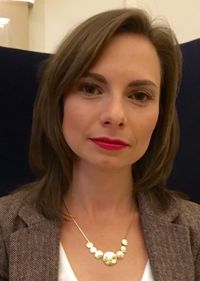Co-Author Zuzana Palovic - CEE and Migration Expert &Co-Author Gabriela Bereghazyova - CEE and Corruption Expert
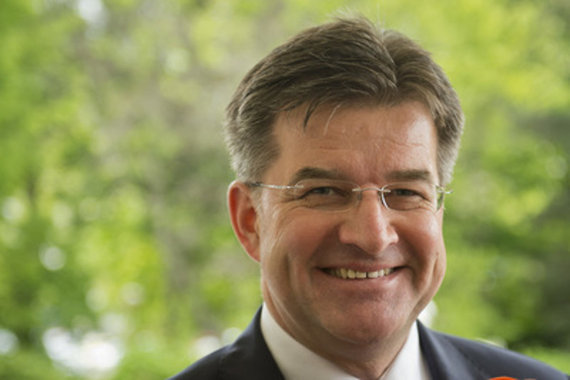 Is the world ready for Miroslav Lajčák? Hopes and emotions run high for the first ever East European Secretary-General of the United Nations / Photo: TASR
Is the world ready for Miroslav Lajčák? Hopes and emotions run high for the first ever East European Secretary-General of the United Nations / Photo: TASR
The looming East-West divide is cracking new and undeniable fractures, not just on the old continent. Britain's exit from Europe and Trump's assertions to pull out from NATO are shaking the very bedrock of the West as we know it, according to expert Anne Applebaum. However, it is not all dark and gloomy. With strife also comes acceleration and emergence of a new global leadership. Amidst the tensions, the election of the 9th Secretary-General of the United Nations is coming up. Unquestionably, the chosen leader for 7 billion holds a tremendous responsibility and increasingly weighing burden.
The Rise of Eastern European Champions
The rise of Miroslav Lajčák, the Slovak Minister of Foreign Affairs, for the top post exemplifies the priorities of the UN. Born out of the ashes of the Second World War, the United Nations was established to prevent the misfortune of another global conflict. The Secretary-General inherits the mission to maintain the delicate balance of peace on our planet. This time around, the spotlight has come to Eastern Europe. The region, which forms the buffer-zone between Russia in the East and the mature democracies in the West, has been waiting patiently its turn since the fall of the Iron Curtain. All signs suggest that the former Eastern Bloc is where the new Secretary-General will come from.
A Man of both East and West
Surging up the ladder from near last, to now close second, let's take a look at the man who made a surprise come back just weeks before the critical SG vote. Lajčák trails behind former Portuguese Prime Minister Guterres in the '1 for 7 billion' post. This swift progress doesn't come as a surprise considering his career and diplomatic achievements. Miroslav Lajčák was born and raised behind the Iron Curtain. As a young professional, he witnessed and led the transformation of his country from the clutches of the Soviet-Bloc towards the free European Union.
A Miracle Geopolitical Turnaround
A champion of the European Union and proponent of Western values, the Slovak Minister of Foreign Affairs is simultaneously well acquainted with the East. The constraints of the era at the start of his career meant that he was a member of the Communist Party. He holds a Doctorate from the prestigious Moscow School of International Relations, the East's equivalent to Harvard. These credentials are well esteemed and respected outside of the West. Combined insights put him in the ideal place for leading peace mediations in Europe's latest war, which witnessed the dissolution of the former Yugoslavia.
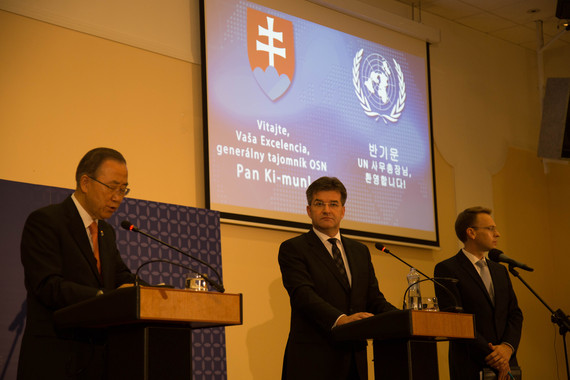 Deputy Prime Minister Miroslav Lajčák hosting current Secretary-General of the UN Ban Ki-moon in Bratislava, Slovakia / Photo: Zuzana Burdanova
Deputy Prime Minister Miroslav Lajčák hosting current Secretary-General of the UN Ban Ki-moon in Bratislava, Slovakia / Photo: Zuzana Burdanova
From Taming a War to the Summit of Presidents
Minister Lajčák's over 20 year international career has already made a global impact. From the positon of the Executive Assistant to the UN's Secretary-General´s Special Envoy, he helped to de-escalate deadly tensions in the conflict ridden Balkans. Helping to tame a war, through understanding and negotiation. Coming from a post-Soviet Bloc perspective, he did not patronize or blame the representatives, like many who came before him. Later, he personally spearheaded the Summit of Presidents between the Russian Federation, Vladimir Putin, and the United States, George W. Bush from his native Slovakia.
Born in the region where East meets West, Mr. Lajčák's life mirrors the convergence of a deeply embedded divide. Having lived half of his life in a totalitarian regime, history flipped his destiny with the collapse of the Iron Curtain. Since, he has championed democracy in the heart of the Europe for the past 25 years. Undoubtedly, the last quarter of century has been the region's most successful ever. However, geopolitical expert George Friedman raises a warning finger. Could this be the beginning of the end of Europe's golden era? In a world of frequent and dramatic twists and turns, where the migration crisis, terrorism and Russia's partial inception of former Soviet territory have all occurred in quick succession, there is no time to waste.
We Need a New Leadership of Genuine Understanding
Is there anyone better for the challenges ahead than the man who has walked a mile in both civilizations? Coming from a peace-loving 'dove nation' born at the crossroads of the worlds, Miroslav Lajčák advocates a middle ground, the 'Slovak way'. In an address given at Harvard, Lajcak stated that relations between Russia and the West have dramatically worsened. At the same time, he argued that the encroachment of the West into Russia's immediate neighborhood drew on a red line. The role of a diplomat is to respect sovereign boundaries, while guarding the ever-volatile balance of global peace.
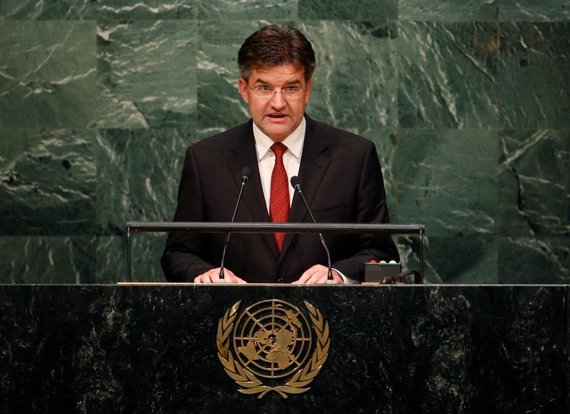 Deputy Prime Minister Miroslav Lajčák speaking at the 70th session of the United Nations General Assembly in New York/ Photo: Thomson Reuters
Deputy Prime Minister Miroslav Lajčák speaking at the 70th session of the United Nations General Assembly in New York/ Photo: Thomson Reuters
Politics behind the vote
China, Russia, the UK, the USA and France all have veto power. These nations must agree and approve of the next elected Secretary-General. China is communist. Russia was communist and in many ways still observes the dictate. Russia's colonial power once stretched to central Europe. Slovakia fell into its sphere of influence and followed its ideology behind the confine of the Iron Curtain. China and Russia have made it clear that a candidate from the once communist East is strongly preferred. In fact, the majority of candidates are from Eastern Europe. The other 3 countries are Western. How will the veto-powers behave? Will rising tension between East and West contribute to a deadlock? Or is this an opportunity to break away from historical lines and look towards a brighter future?
Above all, is the world ready for Slovakia, a country that embodies both East and West, to lead the way? Two months ahead of the final decision hopes and emotions run high for a first ever East European champion leading the vast United Nations. 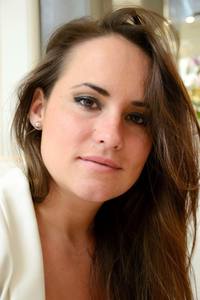 Co-Author Zuzana Palovic - Central Eastern Europe and Migration Expert
Co-Author Zuzana Palovic - Central Eastern Europe and Migration Expert
